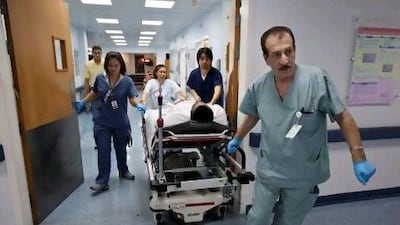ABU DHABI // A new online system for hospitals will monitor the number of fatalities and injuries in the emirate, to provide information on how accidents can be avoided.
The Injury and Poisoning Notification System, which will come into full operation next January, will plug the gap between statistics on injury-related fatalities, which are well known to doctors, and injuries, for which little information is available.
The data, doctors say, will help to develop preventive measures by identifying where and when accidents happen, and who is most at risk.
A report using the system showed almost two-thirds of deaths caused by injury in Abu Dhabi emirate last year were attributed to road accidents.
About 340 of the 537 injury-related deaths in the emirate occurred as a result of crashes, while 66 deaths were caused by falls or falling objects.
Injuries were the second-leading cause of death in the emirate last year, after cardiovascular disease.
The report also revealed about 130,000 people visited emergency rooms across the emirate last year and of them, 12,000 were admitted to hospital.
One in 22 of trauma hospital admissions resulted in death.
While there is data on the number of injury-related deaths, Dr Jens Thomsen, the head of occupational and environmental health at the Health Authority - Abu Dhabi (Haad), said the UAE did not have enough information on non-fatal injuries.
"There is a lack of quality, local data on injuries and poisonings in this emirate," said Dr Thomsen.
"We do have some data on fatal injuries but there is a serious data gap for non-fatal injuries and poisoning cases.
"This data will allow us to study and to assess in more detail the local epidemiology of injuries."
But some doctors and healthcare workers have questioned the value of the system, and expressed concerns about the working hours lost to putting data into it.
Dr Biniam Tesfayohannes, a consultant in emergency medicine and the chairman of Mafraq Hospital's ER, said there was no need for such an extensive, time-consuming system.
"If the aim is to prevent accidents and injuries we already know the tip of the iceberg, which is the mortality rate," Dr Tesfayohannes said.
"Prevention happens all the time - we don't need to collect data to prevent it because we already know. We see it day to day."
He said that once the healthcare system matured, the next step should be finer detail collection to further help reduce the burden.
"The information is out there," Dr Tesfayohannes said. "We know the burden in the Emirates. It's road accidents and falls.
"If we crack that nut, then we are sorted at reducing the burden by at least 50 per cent. And then this fine-tuning of data collection becomes really important."
In terms of fatalities in the workplace, there has been an average of 93.6 occupational fatalities a year since 2007.
Last year, there were 71 deaths on worksites and 12 as a result of a road accident, a drop of about 20 per cent from 2010.
"What is the major cause of these fatal injuries?" asked Darren Joubert, a senior adviser for occupational health at Haad.
"We've found that over the years, about 50 per cent are from falls and falling objects."
Having begun to tackle this particular issue with a height awareness programme, launched in May, the new system will highlight other issues, Mr Joubert said.

